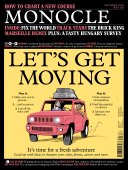
Issue 136
Monocle’s September issue celebrates the marvels of mobility while issuing a call to arms for us all to get outside and make the most of our cities. In a packed issue, we profile the transport movers making it a pleasure to get from A to B and highlight the small cities you’ll want to settle in to start your next venture. Plus: a tasty Hungary survey. Let’s get moving.
In This Issue
Oops! No content was found.
Looks like we no longer have content for the page you're on. Perhaps try a search?
Return Home

